Kristin Cashore's Blog
April 16, 2022
Announcing SEASPARROW, Graceling Realm Book #5, out November 1, 2022!
I'm so very happy to announce that my next Graceling Realm book, Seasparrow, will release on November 1, 2022. Scroll down for my beautiful covers in the US and the UK! I'll also include links for pre-ordering at the bottom of this post.
Seasparrow is told from the point of view of Hava, Queen Bitterblue's secret sister and spy, who has the Grace of changing what you think you see when you look at her. In other words, the Grace of hiding in plain sight. In Seasparrow, Hava sails across the sea toward Monsea with her sister, the royal entourage, and the world's only copies of the formulas for the zilfium weapon Hava saved at the end of Winterkeep. As in all of my books, adventure ensues — the kind of adventure that will cause Hava to do some soul-searching. While Bitterblue grapples with how to carry the responsibility of a weapon that will change the world, Hava has a few mysteries to solve — and a decision to make about who she wants to be in the new world Bitterblue will build. Seasparrow was edited by Andrew Karre. Thank you, Andrew, for helping me help Hava find her wings!
Prior to today, I've only been talking about this book on Twitter, where I don't have a lot of space to say meaningful things. I have space on this blog, so here are a few non-spoilery bits of info about Seasparrow.
* Unlike my other Graceling Realm books, this one is told from the first-person point of view. Why? Because it was right for this book. Hava is a character who's so internal that often other people don't even know she's there. I suppose I can't entirely explain why, when I started writing, I knew I needed to write in first person, but maybe it's because in order to write about Hava, I needed to get deep inside, where she was. I don't think I've ever written a book from the perspective of someone so hidden before. And yet, from the start, Hava let me in. It felt like she was the one making the decision about what point of view we needed.
* Though the page count is higher (624!), the word count is not higher than any of my other Graceling Realm books. That's because Hava's story is told in a lot of pretty short chapters. That felt right for Hava and the way she processes things; again, it felt like she was the one making this decision. Short chapters have a way of creating a sense of empty space inside a printed book, which is an effect I've always liked, so I went with it.
* The interior art that Ian Schoenherr created for Seasparrow is spectacular. Maybe more than any of my books prior to this, I'm excited for the day when I'll have the finished product in my hands.
* Four years ago, I spent some time in the Arctic on a tall ship. I planned this book while I was on that trip. I started writing it the moment I got back. I could not have written this book were it not for my experience doing an artist residency with the organization The Arctic Circle. Here's a link to the blog posts I wrote about my Arctic experience, which are mostly compilations of pictures. Click on "More Posts" at the bottom to see them all.
And now for the covers! Here's the US/Canada cover for Seasparrow, which will be published by Dutton/Penguin Random House. Kuri Huang is the cover artist. Jessica Jenkins is the cover designer. And as I've already said, the interior will include beautiful art by Ian Schoenherr.

And here is the UK/Australia/New Zealand cover for Seasparrow. My editor at Gollancz is Gillian Redfearn. Micaela Alcaino is the cover artist and Tomás Almeida is the in-house designer.

Finally, here are some direct pre-ordering links! Seasparrow can be ordered in the US at:
And in the UK at:
...and wherever books are sold.
Happy holiday weekend for those celebrating. And happy reading!
January 25, 2022
New Year's Reflections
Just after the New Year, I spent some time in Vermont.
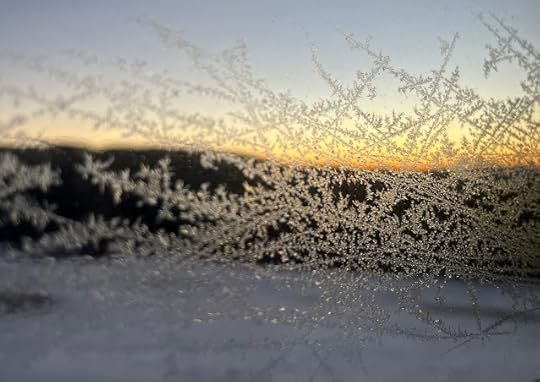
I go to Vermont to write, but ever since the start of the pandemic, I also go there for some clarity of thought. Sometimes it's easier to figure out how you're doing if you can get some distance from everything. Where I go, I have no cell service, internet, or email. I keep my fingers crossed that when I arrive, I won't discover frozen pipes. I haul a lot of wood (so much wood! Wood is heavy!). I start a fire in the stove and hole up for a while, blessed with the great good fortune to be allowed to turn briefly into a hermit.
Occasionally I'm able to talk to Kevin on the phone, and our conversations go something like this: Hi! How have you been? Could you please tell me the names of Henry VIII's wives in order and also which ones were executed?
Because, again, I have no internet. So I keep a running list of all the things I've been wondering. And when you're listening to the audiobook of Wolf Hall while staring out the window,
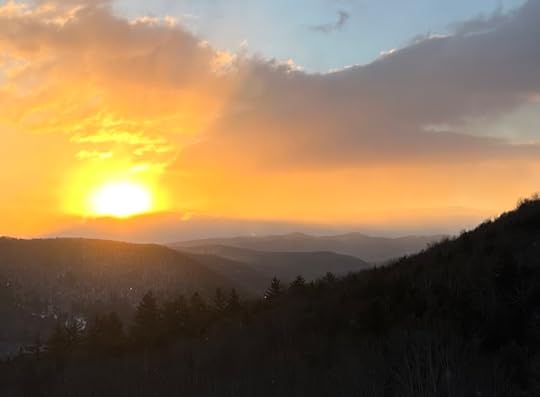
sometimes you realize you want some spoilers. (The answer, if you're interested: (1) Catherine of Aragon. (2) Anne Boleyn, beheaded. (3) Jane Seymour. (4) Anne of Cleves. (5) Catherine Howard, beheaded. (6) Catherine Parr.)
So anyway, I went to Vermont at the New Year. In previous years, I've loved the New Year. It's been a time of reflection and planning for me, a time to find balance and reconsider my intentions. Since the start of the pandemic, I've lost that New Year ritual to a certain extent, because time and its passage have gotten quite confusing. It doesn't seem possible, for example, that Winterkeep was released in 2021. Wasn't that eons ago? But also, I finalized a new book in 2021 (more on that, as soon as I'm allowed to say more) and am more than halfway through writing a new one, plus I have three other ideas begging to be written. How is that possible? Hasn't it been only a year? Didn't time used to be less springy than this? How old am I anyway? Did winter always used to make me this emotional? Why did I used to dislike my gray hair and now I love it? Why did I ever, EVER, put up with itchy tags in my clothes before now? Have my hands always been this cold? When will I see my friends' faces again?
It's really hard to sum up my last year and make plans for the next. I'm thinking in mushy blobs of time, rather than weeks, months, or years. But I am still hoping and planning.
Here are three plans I have for the nearish future:
1. I will finish a draft of a new, contemporary book that I'm currently loving writing. (I actually think this will happen this spring!)
2. I will unveil a website. Finally, after more than a decade, I've hired someone to build me a website! I'm having so, so much fun making my own art for it. I think this will get sorted this summer.
3. I will make some strides in a project currently occupying me and some other family members: dual USA-Italian citizenship.
These are my plans. Of course, every new piece of news and frankly the world in general can gum up the works pretty easily these days. So, we'll see how everything goes. I'm trying to learn flexibility.
I hope you're able to find some flexibility too, and also some clarity of thought, as we move through the New Year.
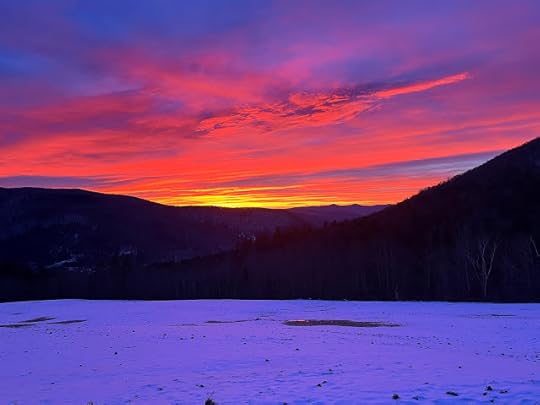
November 16, 2021
Happy Book Birthday to Gareth Hinds and Graceling the Graphic Novel!
Today, Gareth Hinds's beautiful graphic novel adaptation of Graceling hits stores. Join us for an event! Here's a link to all your options.
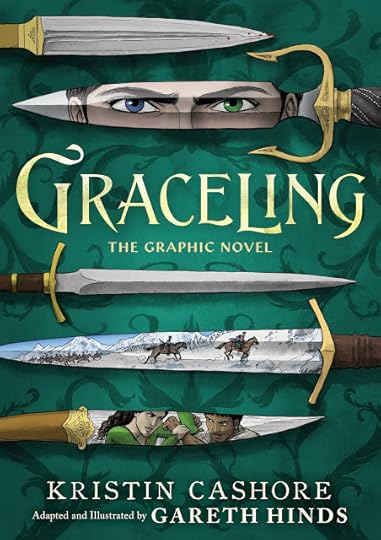
November 6, 2021
Upcoming Online Events with Gareth Hinds for the GRACELING Graphic Novel!
Hi again folks. Just announcing some upcoming events for the release of Gareth Hinds' graphic novel adaptation of Graceling:
Tuesday, November 16, 7pm - East City Books, online, Gareth Hinds and Kristin Cashore in conversation.
Friday, November 19, 7pm - Oblong Books, online, Gareth Hinds and Kristin Cashore in conversation.
Saturday, November 20, 3pm - Books of Wonder, online, Gareth Hinds, Makiia Lucier (Year of the Reaper), and Kristin Cashore in conversation.
Saturday, November 27, 6pm - An Unlikely Story, Plainville MA -- this event is in-person + Facebook and is just Gareth -- I will not be there -- but that means Gareth will do more drawing and process stuff!
You can pre-order signed copies now from any of those stores. Follow the links to order books or sign up for the events. Hope to see you there!
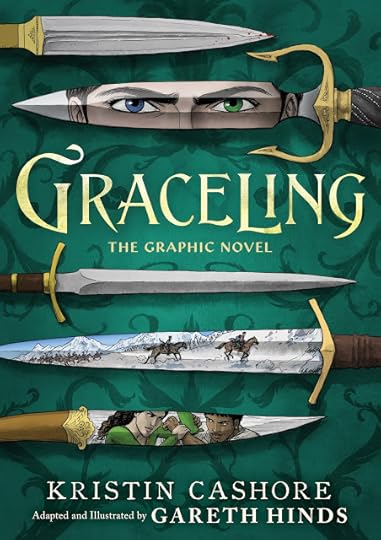
November 5, 2021
How to Buy Signed/Personalized Copies of My Books
Hi everyone! Just checking in with a nice announcement: I am once again signing/personalizing books via my local indie, Harvard Book Store.
I no longer live around the corner from the store, so I expect to go in for signing and personalizing only about once a month or so — so please order ahead if you anticipate wanting something! Once I have more info about holiday deadlines, I'll come back and blog about that. In the meantime, feel free to go ahead and start ordering. Here is the link: https://shop.harvard.com/kristin-cashore-signed-copies.
Notice the instructions at the top: When checking out, indicate in the comments field that you would like a signed copy. Include any personalization you'd like as well. I'm happy to honor requests to wish someone a happy birthday, good luck with their writing, etc., but please do note that if you ask me to write something I'm not comfortable signing my name to (!), I won't honor those requests. (Yes, I've occasionally been asked to write some head-scratchers...) 😂
Hope everybody is doing well. I'll be back very soon with info about upcoming online events for Gareth Hinds' graphic novel adaptation of Graceling, which releases on November 16! And now I'll send you off with a picture from today, in Mount Auburn Cemetery.
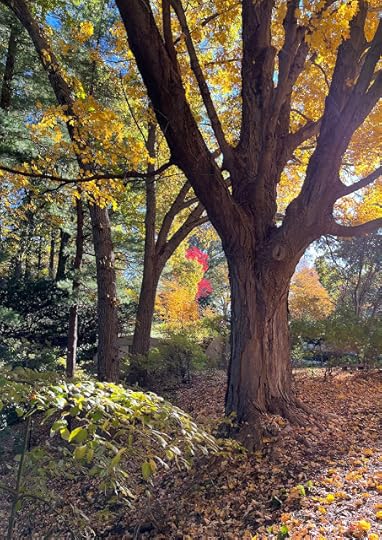
September 6, 2021
Tiny Quick Update
Hi everyone,
I’m deep into revising the next Graceling Realm book (starring Hava), which is why I haven’t been here on the blog. It’s also why over on Twitter, mostly I’ve just been tweeting pictures of candles. I am Very Absorbed. Also, we moved to a new apartment last month. Also life. Also the pandemic and self-care. I hope you’re doing well.
Gareth Hinds’s adaptation of the Graceling graphic novel comes out in November! He's been tweeting some lovely stuff on Twitter, and Graceling: the Graphic Novel is now available for pre-order wherever books are sold. Including at your local indie.
I’ll be back when there’s more news and/or when I have a minute for blogging, whichever comes first. Until then, leaving you with a few of my recent candles…
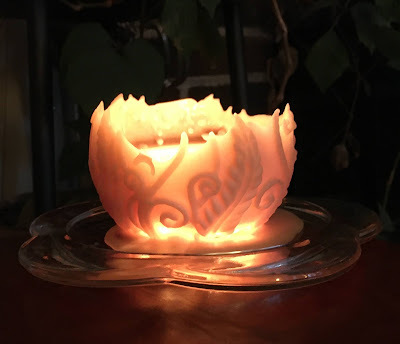
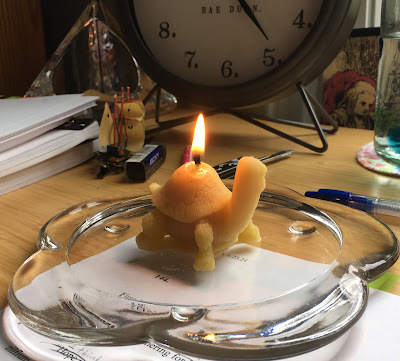
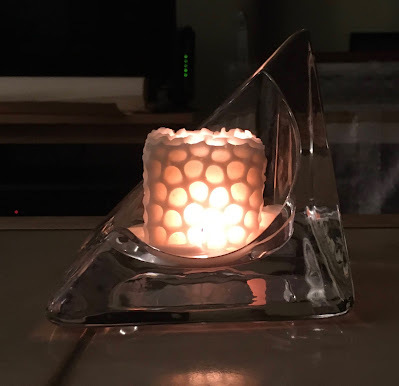
September 4, 2021
These Texas Organizations Need Our Support
Here are a few organizations that need our support right now:
Fund Texas Choice. A nonprofit organization funding abortion travel for people in Texas.
Frontera Fund. Making abortion accessible for people in the Rio Grande Valley.
Clinic Access Support Network. Providing transportation, lodging, emotional support, and more to those seeking abortion care in Houston, TX.
Bridge Collective. A full spectrum doula collective, nonprofit organization based in Austin, TX.
The Afiya Center. An advocacy organization based in Dallas, TX, dedicated to transforming the lives of Black womxn and girls through reproductive justice.
Texas Equal Access Fund. Providing financial and emotional support to people seeking abortion care in the north, east, and panhandle regions of Texas.
Lilith Fund. Financial assistance, emotional support, and building community spaces for people who need abortions in Texas — unapologetically, with compassion and conviction.
West Fund. Working to make abortions accessible and affordable to people in West Texas.
Thank you to the folks at @FundTexasChoice who helped me compile this list.
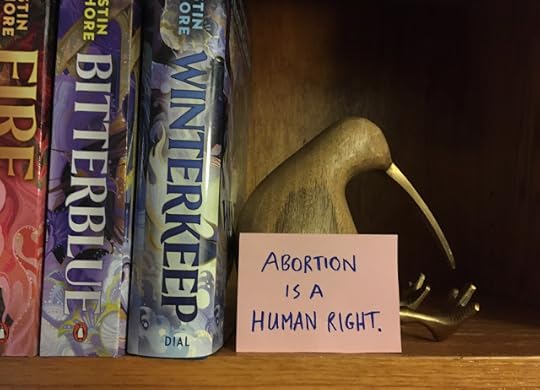
June 26, 2021
An Update on Email Delivery
Hi again everyone,
Just an announcement that I think I've successfully migrated all email subscribers to a new working email service (MailChimp). I tried my best to transfer all verified subscribers to the new list -- and not to transfer any unverified subscribers. Time will tell whether this blog post goes out successfully as an email. (There's a box in the dropdown menu on the left of my homepage for anyone who wants to subscribe to my blog posts via email.)
If there are problems with the new service, I expect I'll realize it pretty soon, and I promise I'll do my utmost to rectify them quickly. Apologies in advance if anything goes amiss!
In the meantime, I have another craft post planned, and a few other thinky posts too. So, more soon. Thanks for your patience with all of this, everyone!
June 20, 2021
Upcoming Changes to Email Delivery
Just a note to those readers who receive my blog post via email: The service that provides this, Feedburner, is shutting down in a couple of weeks, so I'm going to be migrating my subscribers to a new service. If you get an email from me in the next couple of weeks, please pay attention, because you may need to reconfirm your subscription with the new service!
Thanks, and stay tuned!
May 25, 2021
I got a book idea... and this time I paid attention to how it happened so I could answer the FAQ, "Where do you get your ideas?"
Hi everybody.
The question I get most is: "Where do you get your ideas?"
Generally, when I'm asked this question, it's at a book event where it's difficult to answer, because… Well, the answer is long, and complicated, and hard to pin down, and most of the time, I don't really remember how it happened. When an idea starts to arrive, I get to work. I'm not paying attention to how it's happening, or how it would look to an outsider.
But — a few weeks ago, a new book idea started knocking on the door of my mind. And this time, I decided to pay attention!
What follows is probably the most detailed explanation I'll ever give of where my ideas come from. More specifically, where this particular idea came from, because it's not always the same. But my experience of the past few weeks has been fairly typical for me, and I'll add that there are a few activities I need to engage in every single time, if I want an idea to take root. Namely: PATIENCE. LISTENING. And, LABOR. Book ideas require a certain honed receptiveness, and they require a LOT OF WORK.
I'm yelling because I'm trying to push back against the idea that ideas simply come to writers. Yes, some parts of ideas come to writers. But when I first get a book idea, what "comes to me" probably comprises about 0.1% of what could properly be called a book idea. Often, it's little more than an inchoate feeling. With patience, listening, and labor, I transform the idea into something I can grasp, and work with.
I'll add that yes, we do hear sometimes of writers whose ideas "simply came to them," fully formed. I'm going to take a guess that (1) this doesn't happen very often, if ever, with books that have complicated structures or plots, and (2) writers who are blessed by ideas in this way probably have a long-honed practice of receptiveness.
Anyway. Warning upfront that this may be a little unstructured, because the process is a little unstructured. It's challenging to describe, and I'm still in the middle of it. But here's what my last few weeks have been like.
A few weeks ago, while watching a TV show that had a certain mood/aura that'd really sucked me in, I found myself drawn to the idea of a story involving three characters. I'm not going to tell you what TV show I was watching, and I'm not going to tell you anything about my three characters, because story ideas are intensely, intensely private. The first time I say anything publicly about it will probably be years from now, if and when this book is ever scheduled for release. But let me try to explain a bit about that moment when the first glimmering of the idea appeared.
Like I said, I'd been watching a TV show when it happened. But my three characters weren't characters in that TV show. Nor did anyone in that TV show relate to each other the way my three characters seemed to want to relate. Nor did my three characters seem to live in a world like the world of the TV show. The TV show helped to launch the idea at me because of the show's mood and its feeling, and how much I cared about the people in it. But my idea? As is often the case, my idea came from something I saw missing in the TV show. Not missing because there was a flaw in the TV writers' story; I loved their story! But missing (for me and possibly only me) because their story was not the story I would have told.
I think that a lot of my idea seeds come from my adoration of other people's stories, but also from my noticing what's missing in those stories, for me. What story I would've like to have seen told; what characters the story lacked.
Anyway. So this idea of these three characters came to me. But when I say "idea of these three characters," already that sounds more substantial than it was. I knew they were three humans (or humanoids; I didn't know what genre the story was, so they could've been aliens on another planet, for all I knew. In fact, I actively considered whether they might have different biology than ours). I knew they cared about each other, but I didn't know in what way. I knew they were facing a challenge that would strain all of their relationships. I thought they might be grown-ups, but I wasn't sure. I thought I knew at least two of their genders, but I wasn't sure. I knew they lived in a world with magic, but I didn't know what "magic" meant in the context of their world. I didn't know where they lived, or when they lived (past? future? futuristic past? postindustrial future? any of about a hundred other possibilities). I knew a whole lot of things that the characters weren't, and that the world wasn't — which is another way of saying that my sense of what this story was was actually more defined by all the things I knew it wasn't. (Apologies if this is vague. I'm not being intentionally vague! I'll try for some concrete examples: I knew I didn't want to write a story where partway through, someone suddenly discovers they have an inborn power they didn't know they had. I knew I didn't want to write a love triangle. There's a certain kind of high-handed fantasy tone that I knew wasn't right for this story. But I didn't know what I did want yet at this point.)
Really, all I knew was that I seemed to be having an idea.
So, like a writer, I did what I needed to do:
I made space in my mind for receptiveness. (I scheduled uninterruptable alone time. I stopped listening to podcasts while I was out walking, and instead, just walked, so my mind could wander. I put aside non-urgent tasks for a while so that I didn't have the feeling of a to-do list hanging over my head. I gave myself permission to wool-gather, to become vague and absent-minded. I set three timers any time I cooked anything so I could feel free to forget I was cooking, but also not burn the house down. I remembered to thank my husband frequently for being willing to live with a space cadet.)I thought about what fertilizer might help the idea to grow, especially fertilizer in the form of books, TV, and movies. I put all other books, TV, and movies aside. (I kept watching that same TV show, and I also began reading almost exclusively one writer who had a narrative tone — and also subject matter — that helped me sustain a mood that felt concurrent with the mood of my own idea. Why does this kind of intake help? It keeps my mind in a story space, while also giving me something to bounce my own ideas off of. It's a kind of reading, or watching, that involves a state of constant interactivity and reactivity. Everything I'm consuming becomes about something else that I'm looking for. It's difficult to explain, maybe because it gets back to that inexplicable moment when new ideas form.)I made sure that every single time I had any new thoughts relating to my idea, I wrote them down. (This meant making reminders on my phone; sending strings of emails to myself; choosing a notebook where I began to jot things down; sending texts to myself on my husband's phone, if his phone was closer to hand than mine.)I looked at my schedule to give myself a sense of if and when I might have a few days soon to put my current writing project aside and give some true, devoted time to this new idea. (I was, and still am, in the middle of revisions of the next Graceling Realm book when this happened, and that was, and still is, my absolute first priority. As exciting and intense as a new idea can be, it can't unseat me from my current object of devotion.)By chance, last week, I did in fact have some time away from my revision while it was briefly with my editor. I was able to devote an entire week to the new book idea. So, next, I'll try to describe what a week of intense idea-gathering looks like for me! (Though I should say that this will differ from book to book. It's been pretty clear to me from the beginning that this new idea is going to be slow to grow — planning this book will take way more than a week. In contrast, last fall, I found myself with a new and sudden book idea that coincided with the end of another project, so I had some free time and was able to sit down and hammer out the entire book plan, which took only a few days. I think this is because that book was shorter and less emotionally complicated than this new book will be, and was set in a less complex world. Also, at the time, I was absolutely thrumming with the adrenaline and momentum of having just finished a writing project, so book-planning became a way to channel that energy. Often these processes are subject to whatever else is going on in my life.)
So. My week of intense idea-gathering looked a lot like what I've already described — reading, watching TV, but now also with long hours of sitting staring at a blank page and/or lying on my back staring at the ceiling — but with a more specific goal. Namely, I was trying to figure out what my main questions were. For me, every book starts (and continues, as I write) with an extremely long list of questions that I'm trying to find the answers to, but it takes work to figure out what the questions are. The questions can be very different from book to book. And it's essential, at the beginning, to identify what the main questions are.
When I'm first idea-gathering, I use very short notebooks in which I scribble down all my random thoughts as they come (I like using these twenty-page notebooks from Laughing Elephant, because they're short enough not to feel intimidatingly important). Then I have one longer, thicker notebook which is for my more coherent thoughts — my more serious book planning. During my week of active idea-gathering, I came up with the following list of major questions, worthy of being written down in my thick, "serious" planning notebook:
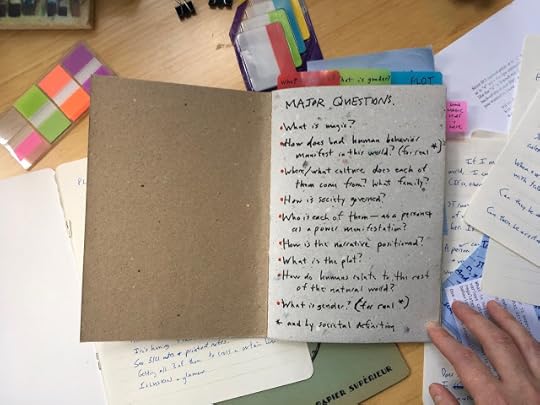
MAJOR QUESTIONS.So. I'm not sure how closely you looked at those questions — but they are pretty gigantic questions! It took me a week to identify all of them. It's going to take me much, much longer to answer them. Which goes back to my point that ideas don't just "come to me." The merest seed of an idea might come to me, and after that, I make the space, and do the work.
What is magic?How does bad human behavior manifest in this world? (for real *)Where/what culture does each of them come from? What family?How is society governed?Who is each of them — as a person and as a power manifestation?How is the narrative positioned?What is the plot?How do humans relate to the rest of the natural world?What is gender? (for real *)* and by societal definition
As I began to hammer out my questions, I continued to read, watch things, and wool-gather, but with more intense focus. Because now I was also trying to answer these questions as they came. It was interesting to observe the order in which I began to find the answers. Not surprisingly, probably since my novels tend to be character-based, it was the character-based questions that drew me in first. “What is gender" in particular, because I have a sense that in this story, my characters' relationships to gender are absolutely integral to who they are, and I can’t get very far with a book plan if I don’t know who my characters are. I also started to gather some clues about their personalities and their strengths. Enough that after a couple of days, I got to the point where I suddenly knew I needed their names. Names ground everything, and they can also change some things; at a certain point, I can't make any further progress without names. I spent one entire day last week mostly just trying to figure out three people's names. Once I had the names, I was able to return to my questions.
Then, not too long after that, a moment arose where I knew, again quite suddenly, that what I needed next was at least the broad strokes of a plot. If I’m a little scornful about the concept of inspiration — because it’s a concept that dismisses how hard I work! — I do believe in intuition, and also in experience. Intuition and experience told me that I'd reached the point in my planning where the needs of my plot would hold the answer to a lot of my other questions. Like, how this place is governed; what constitutes bad behavior; and even some character things, like what culture each of my characters is from. Sometimes, once you know what needs to happen in a story, it becomes easier to picture the structure of your world. Because a plot comes with needs; once a plot exists, it limits some of your other options. For example, let's say your plot involves a particular kind of government-based corruption. Well, thinking about that corruption will probably start to show you some of your options for the structure of the government. Once you know the structure of the government, you might begin to understand who holds governmental power — which can lead to answers about how families are structured. Which can lead to answers about culture, which can lead to answers about the societal definition of bad behavior, etc.
So. I reached the point where I needed at least a sense of my plot. But: plotting is a HUGE job. I knew it wasn't something I could do in just a few days, and at this point I also knew that I was going to need to return to my revision soon. So, intuition told me that it was time to stop. Not stop being receptive; not necessarily stop reading or watching the helpful things; not stop sending myself emails, texts, and reminders; but stop trying to make any real, meaty, major progress on this book idea. I needed to save the job of plotting for when I next had a stretch of uninterrupted worktime. Maybe another free week or two somewhere, between other projects.
So, I did some final organizing of my notebook. I transferred things into it from other notebooks and I designating a huge number of empty pages in it for future plot thoughts and future character thoughts. I did this even though in this book, as in most of my books, I sense that character and plot will ultimately end up being the same thing, so it's not going to matter much which thoughts I file where. (In other words, most of my plot is going to spring from who my characters are, and many of my characters will spring from the needs of the plot.) But at this messy stage in planning, it's important to me to feel organized. The illusion of organization stops me from feeling as overwhelmed as I probably should be feeling. So I label things, and delude myself that I can contain this messy process inside a nice neat notebook 😊.
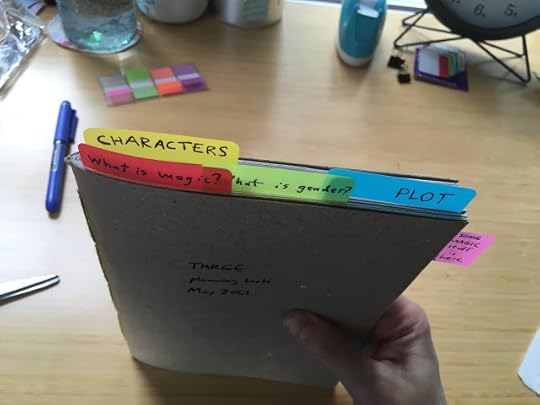
I organized my notebook, and then I put it aside. Today I'm still open to thoughts about my new book idea, but it's not my entire worklife anymore... it's more of a promise for the future. It'll probably be good to have it simmering on the back burner for a while. I'll be able to approach it with a new freshness when I sit down with it again one day.
So. I'm not sure how satisfyingly I've answered the question "Where do you get your ideas?" After all, this idea is still very much in progress. I figured out a lot of stuff last week, but mostly what I figured out is a long list of all the things I don't know yet. There will be many, many more workweeks to go before I'll be able to claim that I truly have an idea for a book.
But this is my best shot at an answer to the question of where my ideas come from! I guess the point I want to convey is this: I don’t necessarily believe in inspiration. But I believe that sometimes a writer will start to get the merest sense of a story that's missing from the world, and find herself wanting to write that story. At that point, if circumstance allows her the time and space to enter a state that is extremely internally-focused and possibly involves a lot of intake (reading, watching other stories), or if not that, at least an extreme level of sensitivity and receptiveness, of seeing, of listening... And if she puts in the work… her idea-seed will start to take root, and grow into a real, workable idea that might one day be the beginnings of a book!
And of course, every writer does this differently. Many writers don't plan or plot ahead of time. They figure out the idea as they write. So there's no right or wrong way to do it.
But this is my best explanation of how I do it.
Godspeed to all writers.
Kristin Cashore's Blog
- Kristin Cashore's profile
- 16967 followers



